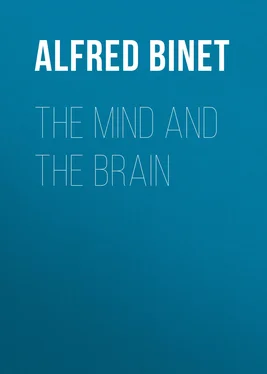Alfred Binet - The Mind and the Brain
Здесь есть возможность читать онлайн «Alfred Binet - The Mind and the Brain» — ознакомительный отрывок электронной книги совершенно бесплатно, а после прочтения отрывка купить полную версию. В некоторых случаях можно слушать аудио, скачать через торрент в формате fb2 и присутствует краткое содержание. Жанр: foreign_prose, foreign_religion, Философия, foreign_psychology, foreign_antique, на английском языке. Описание произведения, (предисловие) а так же отзывы посетителей доступны на портале библиотеки ЛибКат.
- Название:The Mind and the Brain
- Автор:
- Жанр:
- Год:неизвестен
- ISBN:нет данных
- Рейтинг книги:4 / 5. Голосов: 1
-
Избранное:Добавить в избранное
- Отзывы:
-
Ваша оценка:
- 80
- 1
- 2
- 3
- 4
- 5
The Mind and the Brain: краткое содержание, описание и аннотация
Предлагаем к чтению аннотацию, описание, краткое содержание или предисловие (зависит от того, что написал сам автор книги «The Mind and the Brain»). Если вы не нашли необходимую информацию о книге — напишите в комментариях, мы постараемся отыскать её.
The Mind and the Brain — читать онлайн ознакомительный отрывок
Ниже представлен текст книги, разбитый по страницам. Система сохранения места последней прочитанной страницы, позволяет с удобством читать онлайн бесплатно книгу «The Mind and the Brain», без необходимости каждый раз заново искать на чём Вы остановились. Поставьте закладку, и сможете в любой момент перейти на страницу, на которой закончили чтение.
Интервал:
Закладка:
Let us recognise that there is, in all this contempt on the part of physicists for sensation, only differences in language, and that a paraphrase would suffice to correct them without leaving any trace. Be it so. But something graver remains. When one is convinced that our knowledge of the outer world is limited to sensations, we can no longer understand how it is possible to give oneself up, as physicists do, to speculations upon the constitution of matter.
Up to the present there have been three principal ways of explaining the physical phenomena of the universe. The first, the most abstract, and the furthest from reality, is above all verbal. It consists in the use of formulas in which the quality of the phenomena is replaced by their magnitude, in which this magnitude, ascertained by the most precise processes of measurement, becomes the object of abstract reasoning which allows its modifications to be foreseen under given experimental conditions. This is pure mathematics, a formal science depending upon logic. Another conception, less restricted than the above, and of fairly recent date, consists in treating all manifestations of nature as forms of energy. This term "energy" has a very vague content. At the most it expresses but two things: first, it is based on a faint recollection of muscular force, and it reminds one dimly of the sensation experienced when clenching the fists; and, secondly, it betrays a kind of very natural respect for the forces of nature which, in all the images man has made of them, constantly appear superior to his own. We may say "the energy of nature;" but we should never say, what would be experimentally correct; "the weakness of nature." The word "weakness" we reserve for ourselves. Apart from these undecided suggestions, the term energy is quite the proper term to designate phenomena, the intimate nature of which we do not seek to penetrate, but of which we only wish to ascertain the laws and measure the degrees.
A third conception, more imaginative and bolder than the others, is the mechanical or kinetic theory. This last absolutely desires that we should represent to ourselves, that we should imagine, how phenomena really take place; and in seeking for the property of nature the most clearly perceived, the easiest to define and analyse, and the most apt to lend itself to measurement and calculation, it has chosen motion. Consequently all the properties of matter have been reduced to this one, and in spite of the apparent contradiction of our senses, it has been supposed that the most varied phenomena are produced, in the last resort, by the displacement of material particles. Thus, sound, light, heat, electricity, and even the nervous influx would be due to vibratory movements, varying only by their direction and their periods, and all nature is thus explained as a problem of animated geometry. This last theory, which has proved very fertile in explanations of the most delicate phenomena of sound and light, has so strongly impressed many minds that it has led them to declare that the explanation of phenomena by the laws of mechanics alone has the character of a scientific explanation. Even recently, it seemed heresy to combat these ideas.
Still more recently, however, a revulsion of opinion has taken place. Against the physicists, the mathematicians in particular have risen up, and taking their stand on science, have demonstrated that all the mechanisms invented have crowds of defects. First, in each particular case, there is such a complication that that which is defined is much more simple than the definition; then there is such a want of unity that quite special mechanisms adapted to each phenomenal detail have to be imagined; and, lastly—most serious argument of all—so much comprehensiveness and suppleness is employed, that no experimental law is found which cannot be understood mechanically, and no fact of observation which shows an error in the mechanical explanation—a sure proof that this mode of explanation has no meaning.
My way of combating the mechanical theory starts from a totally different point of view. Psychology has every right to say a few words here, as upon the value of every kind of scientific theory; for it is acquainted with the nature of the mental needs of which these theories are the expression and which these theories seek to satisfy. It has not yet been sufficiently noticed that psychology does not allow itself to be confined, like physics or sociology, within the logical table of human knowledge, for it has, by a unique privilege, a right of supervision over the other sciences. We shall see that the psychological discussion of mechanics has a wider range than that of the mathematicians.
Since our cognition cannot go beyond sensation, shall we first recall what meaning can be given to an explanation of the inmost nature of matter? It can only be an artifice, a symbol, or a process convenient for classification in order to combine the very different qualities of things in one unifying synthesis—a process having nearly the same theoretical value as a memoria technica , which, by substituting letters for figures, helps us to retain the latter in our minds. This does not mean that figures are, in fact, letters, but it is a conventional substitution which has a practical advantage. What memoria technica is to the ordinary memory, the theory of mechanics should be for our needed unification.
Unfortunately, this is not so. The excuse we are trying to make for the mechanicians is illusory. There is no mistaking their ambition, Notwithstanding the prudence of some and the equivocations in which others have rejoiced, they have drawn their definition in the absolute and not in the relative. To take their conceptions literally, they have thought the movement of matter to be something existing outside our eye, our hands, and our sense; in a word, something noumenal , as Kant would have said. The proof that this is their real idea, is that movement is presented to us as the true outer and explanatory cause of our sensations, the external excitement to our nerves. The most elementary works on physics are impregnated with this disconcerting conception. If we open a description of acoustics, we read that sound and noise are subjective states which have no reality outside our auditory apparatus; that they are sensations produced by an external cause, which is the vibratory movement of sonorous bodies—whence the conclusion that this vibratory movement is not itself a sensation. Or, shall we take another proof, still more convincing. This is the vibratory and silent movement which is invoked by physicists to explain the peculiarities of subjective sensation; so that the interferences, the pulsations of sound, and, in fine, the whole physiology of the ear, is treated as a problem in kinematics, and is explained by the composition of movements.
What kind of reality do physicists then allow to the displacements of matter? Where do they place them, since they recognise otherwise that the essence of matter is unknown to us? Are we to suppose that, outside the world of noumena , outside the world of phenomena and sensations, there exists a third world, an intermediary between the two former, the world of atoms and that of mechanics?
A short examination will, moreover, suffice to show of what this mechanical model is formed which is presented to us as constituting the essence of matter. This can be nothing else than the sensations, since we are incapable of perceiving or imagining anything else. It is the sensations of sight, of touch, and even of the muscular sense. Motion is a fact seen by the eye, felt by the hand; it enters into us by the perception we have of the solid masses visible to the naked eye which exist in our field of observation, of their movements and their equilibrium and the displacement we ourselves effect with our bodies. Here is the sensory origin, very humble and very gross, of all the mechanics of the atoms. Here is the stuff of which our lofty conception is formed. Our mind can, it is true, by a work of purification, strip movement of most of its concrete qualities, separate it even from the perception of the object in motion, and make of it a something or other ideal and diagrammatic; but there will still remain a residuum of visual, tactile, and muscular sensations, and consequently it is still nothing else than a subjective state, bound to the structure of our organs. We are, for the rest, so wrapped up in sensations that none of our boldest conceptions can break through the circle.
Читать дальшеИнтервал:
Закладка:
Похожие книги на «The Mind and the Brain»
Представляем Вашему вниманию похожие книги на «The Mind and the Brain» списком для выбора. Мы отобрали схожую по названию и смыслу литературу в надежде предоставить читателям больше вариантов отыскать новые, интересные, ещё непрочитанные произведения.
Обсуждение, отзывы о книге «The Mind and the Brain» и просто собственные мнения читателей. Оставьте ваши комментарии, напишите, что Вы думаете о произведении, его смысле или главных героях. Укажите что конкретно понравилось, а что нет, и почему Вы так считаете.












